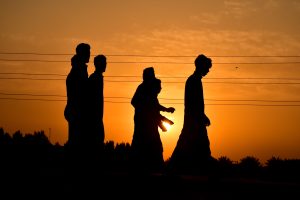Among those Malik narrated from in the Muwatta’: Ayyub al-Sakhtyani, Ja`far ibn Muhammad (al-Sadiq), Zayd ibn Aslam, `Ata’ al-Khurasani, al-Zuhri, Ibn al-Munkadir, `Alqama, Nafi` the freedman of Ibn `Umar, and others. Among those who narrated from Malik: al-Zuhri, Ibn Jurayj, Abu Hanifa, al-Awza`i, Sufyan al-Thawri, Shu`ba, Ibn al-Mubarak, Muhammad ibn al-Hasan, `Abd al-Rahman ibn Mahdi, Waki`, Yahya al-Qattan, al-Shafi`i, Ibn Wahb, Abu Dawud al-Tayalisi, `Abd al-Razzaq, and many others.
The Prophet (Sallallahu Alayhi Wa Sallam) said: “Very soon will people beat the flanks of camels in search of knowledge, and they shall find no-one more knowledgeable than the knowledgeable scholar of Madina.” Al-Tirmidhi, al-Qadi `Iyad, Dhahabi and others relate from Sufyan ibn `Uyayna, `Abd al-Razzaq, Ibn Mahdi, Ibn Ma`in, Dhu’ayb ibn `Imama, Ibn al-Madini, and others that they considered that scholar to be Malik ibn Anas. It is also related from Ibn `Uyayna that he later considered it to be `Abd Allah ibn `Abd al-`Aziz al-`Umari. Al-Dhahabi said of the latter: “He possessed knowledge and good fiqh, spoke the truth fearlessly, ordered good, and remained aloof from society.
Ibn `Abd al-Barr said that Malik was the first who compiled a book formed exclusively of sound narrations. Abu Bakr ibn al-`Arabi said: “The Muwatta’ is the first foundation and the core, while al-Bukhari’s book is the second foundation in this respect. Upon these two all the rest have built, such as Muslim and al-Tirmidhi.” Shah Wali Allah said something similar and added that it is the principal authority of all four Schools of Law, which stand in relation to it like the commentary stands in relation to the main text. Malik composed it in the course of forty years, having started with ten thousand narrations until he reduced them to their present number of under 2,000.
Al-Suyuti said: “There is no mursal narration in the Muwatta’ except it has one or several strengthening proofs (`âdid aw `awâdid).” Ibn Abd al-Barr composed a book in which he listed all the narrations of the Muwatta’ that are either mursal, or munqati`, or mu`dal, and he provided complete sound chains for all of them except four.
Al-Zurqani counted as sixty-nine the number of those who narrated the Muwatta’ directly from Malik, geographically spread as follows:
- Seventeen in Madina, among them Abu Mus`ab Ahmad ibn Abi Bakr al-Zuhri, whose version has received a recent edition;
- Two in Mecca, among them al-Shafi`i;
- Ten in Egypt, among them `Abd Allah ibn Wahb, `Abd Allah ibn Yusuf al-Tinnisi al-Dimashqi, whose narration al-Bukhari chose, and Dhu al-Nun al-Misri;
- Twenty-seven in Iraq, among them `Abd al-Rahman ibn Mahdi, whose narration Ahmad ibn Hanbal chose, Yahya ibn Yahya al-Tamimi al-Hanzali al-Naysaburi, whose narration Muslim chose, and Abu Hanifa’s student Muhammad ibn al-Hasan al-Shaybani, whose version has been published but greatly differs from the others and also contains other than what is narrated from Malik, so that it became known as Muwatta’ Muhammad;
- Thirteen in al-Andalus, among them the jurist Yahya ibn Yahya al-Laythi “the Sage of al-Andalus” û thus nicknamed by Malik himself û whose version is the most commonly used today and is the version meant by the term “Malik’s Muwatta’.” He is mainly responsible for the spread of the Maliki School in al-Andalus.
- Two from al-Qayrawan;
- Two from Tunis;
- Seven from al-Sham.
Imam Malik is the connection of the entire Islamic Community to the knowledge of the Sunna as it was preserved by the scholars of the Prophet’s city, al-Madina. This reference-point of his school of jurisprudence is observed time and again in the Muwatta’ with the phrase: “And this is what I have found (or seen) the people of knowledge practicing.” He was keenly aware of his mission as both the transmitter and the elucidator of the Sunna. This is characteristic of his students’ praise of him, beginning with al-Shafi`i’s famous sayings: “No-one constitutes as great a favor to me in Allah’s Religion as Malik” and “When the scholars of knowledge are mentioned, Malik is the guiding star.”
I went in to see Malik ibn Anas. He said to me: “Look under my place of prayer or prayer-mat and see what is there.” I looked and found a certain writing. He said: “Read it.” It contained the account of a dream which one of his brothers had seen and which concerned him. Malik recited it [from memory]: “I saw the Prophet (Sallallahu Alayhi Wa Sallam) in my sleep. He was in his mosque and the people were gathered around him, and he said: ‘I have hidden for you under my pulpit (minbar) something good – or: knowledge – and I have ordered Malik to distribute it to the people.’” Then Malik wept, so I got up and left him.
The caliph Abu Ja`far al-Mansur had forbidden Malik to narrate the Hadith: “The divorce of the coerced does not take effect” (laysa `ala mustakrahin / li mukrahin talâq). Then a spy came to Malik and asked him about the issue, whereupon Malik narrated the hadith in front of everyone. He was seized and lashed until his shoulder was dislocated and he passed out. When he came to, he said: “He [al-Mansur] is absolved of my lashing.” When asked why he had absolved him, Malik replied: “I feared to meet the Prophet after being the cause for the perdition of one of his relatives.” Ibrahim ibn Hammad said he saw Malik being carried up and walking away, carrying one of his hands with the other. Then they shaved his face and he was mounted on a camel and paraded. He was ordered to deprecate himself aloud, whereupon he said: “Whoever knows me, knows me; whoever does not know me, my name is Malik ibn Anas, and I say: The divorce of the coerced is null and void!” When news of this reached Ja`far ibn Sulayman (d. 175) the governor of Madina and cousin of al-Mansur, he said: “Bring him down, let him go.”
Imam Malik held the Hadith of the Prophet (Sallallahu Alayhi Wa Sallam) in such reverence that he never narrated anything nor gave a fatwa unless in a state of ritual purity. Isma`il ibn Abi Uways said: “I asked my uncle Malik about something. He bade me sit, made ablution, sat on the couch, and said: la hawla wa la quwwata illa billah. He did not give a fatwa except he said it first.” Al-Haytham said: “I heard Malik being asked forty eight questions, to thirty-two of which he replied: ‘I do not know.’” Abu Mus`ab reported that Malik said: “I did not give fatwas before seventy scholars first witnessed to my competence to do it.”
Malik’s ethics, together with the states of awe and emotion which were observed on him by his entourage, were no doubt partly inherited from great shaykhs of his such as Ja`far al-Sadiq, Ibn Hurmuz, and Ibn Shihab al-Zuhri. He visited his shaykh Ibn Hurmuz (d. 148) every day from morning to night for a period of about eight years and recounts: “I would come to Ibn Hurmuz, whereupon he would order the servant to close the door and let down the curtain, then he would start speaking of the beginning of this Umma, and tears would stream down his beard.” The Maliki shaykh Ibn Qunfudh al-Qusantini (d. 810) wrote:
It was the practice of the Pious Predecessors and the Imams of the past that whenever the Prophet was mentioned in their presence they were overwhelmed by reverence, humbleness, stillness, and dignity. Ja`far ibn Muhammad ibn `Ali ibn al-Husayn ibn `Ali ibn Abi Talib would turn pale whenever he heard the Prophet mentioned. Imam Malik would not mention a hadith except in a state of ritual purity. `Abd al-Rahman ibn al-Qasim ibn Muhammad ibn Abu Bakr al-Siddiq would turn red and stammer whenever he heard the Prophet mentioned. As for `Amir ibn `Abd Allah ibn al-Zubayr ibn al-`Awamm al-Asadi (one of the early Sufis), he would weep until his eyes had no tears left in them. When any hadiths were mentioned in their presence they would lower their voices. Malik said: “The Prophet’s sacredness (hurma) is in death is as his sacredness was in life.”
Qutayba said: “When we went to see Malik, he would come out to us adorned, wearing kuhl on his eyes, perfumed, wearing his best clothes, sit at the head of the circle, call for palm-leaf fans, and give each one of us a fan.” Muhammad ibn `Umar: “Malik’s circle was a circle of dignity and courtesy. He was a man of majestic countenance and noblity. There was no part for self-display, vain talk, or loud speech in his circle. His reader would read for all, and no-one looked into his own book, nor asked questions, out of awe before Malik and out of respect for him.”
When the caliph al-Mahdi sent his sons Harun and Musa to learn from Malik, the latter would not read to them but told them: “The people of Madina read before the scholar just like children read to the teacher, and if they make a mistake, he corrects them.” Similarly when Harun al-Rashid with his own two sons requested Malik to read for them, he replied: “I have stopped reading for anybody a long time ago.” When Harun requested the people to leave so that he could read freely before Malik, the latter also refused and said: “If the common people are forbidden to attend because of the particulars, the latter will not profit.” It is known that Malik’s way in the transmission of hadith, like Ibn al-Musayyib, `Urwa, al-Qasim, Salim, Nafi`, al-Zuhri, and others, was `ard (“reading by the student”) and not samâ` (“audition from the shaykh”), although the student states by convention, in both cases: “So-and-so narrated to us.”
The caliph Harun al-Rashid said to Malik after hearing his answers to certain questions he put to him: “You are, by Allah! the wisest of people and the most knowledgeable of people.” Malik replied: “No, by Allah! O Leader of the Believers.” He said: “Yes! But you keep it hidden. By Allah! If I live, I shall put your sayings in writing like the mushafs are put down in writing, and I shall disseminate them to the ends of the world.” But Malik refused.
When one of the caliphs manifested his intention to replace the Prophet’s wooden pulpit with a pulpit of silver and jewels Malik said: “I do not consider good the hindrance of the people from access to the Prophet’s relics.” (lâ ara an yuhrama al-nâsu athara rasulillah.)
Among Malik’s sayings:
- From Ibn Wahb: “Knowledge, Allah places wherever He wills. It does not consist in narrating a lot.”
- From Ibn Wahb: “The saying has reached none renounces the world and guards himself except he will speak wisdom.”
- From Ibn Wahb: “Knowledge diminishes and does not increase. Knowledge has diminished incessantly after the Prophets and the Books.”
- From `Abd Allah ibn `Abd al-Hakam: “The Companions differed in the Branches (al-furû`) and split into factions (tafarraqû), and each one of them was correct in himself.”
- From Yahya ibn Yahya al-Tamimi and Malik’s shaykh Rabi`a ibn Abi `Abd al-Rahman: “We were with Malik when a man came and asked him: ‘O Abu `Abd Allah! “The Merciful is established over the Throne” (20:5): how is He established?’ Malik lowered his head and remained thus until he was completely soaked in sweat. Then he said: ‘The establishment is not unknown; the “how” is inconceivable; belief in it is obligatory; asking about it is an innovation; and I do not think that you are anything but an innovator.’ Then he ordered that the man be led out.”
- From Ma`n: “Disputation (al-jidâl) in the Religion fosters self-display, does away with the light of the heart and hardens it, and bequeaths aimless wandering.”
- From Ma`n and others: “There are four types of narrators one does not take from: An outright scoffer, even if he is the greatest narrator; an innovator who invites people to his innovation; someone who lies about people, even if I do not charge him with mendacity in hadith; and a righteous, honorable worshipper if he does not memorize what he narrates.” Malik’s last clause refers to the two conditions sine qua non of the trustworthy narrator, who must possess not only moral uprightness (`adâla) but also accuracy in transmission (dabt). The clause elucidates the paradox current among hadith scholars whereby “No-one lies more than the righteous.” The reason for this is that the righteous do not doubt the Muslim’s attribution of a saying to his Prophet, and so they accept it without suspicion, whereas al-Shafi`i said: “If Malik had the slightest doubt about a hadith, he discarded the entire Hadith.”
In the Muwatta’: “Shaving the moustache is an innovation.” It is elsewhere related that Malik himself was tall, heavyset, imposing of stature, very fair, with white hair and beard but bald, with a huge beard and blue eyes; he “detested and condemned” shaving of the moustache, and he always wore beautiful clothes, especially white.
Narrated by Ibn Abi Zayd: “The turban was worn from the beginning of Islam and it did not cease to be worn until our time. I did not see anyone among the People of Excellence except they wore the turban, such as Yahya ibn Sa`id, Rabi`a, and Ibn Hurmuz. I would see in Rabi`a’s circle more than thirty men wearing turbans and I was one of them; Rabi`a did not put it down until the Pleiades rose and he used to say: ‘I swear that I find it increases intelligence.’ Jibril was seen in the image of (the Companion) Dihya (ibn Khalifa) al-Kalbi wearing a turban with its extremity hanging between his shoulder-blades.” Ashhab said: “When Malik wore the turban he passed it under his chin and let its extremity hang behind his back, and he wore musk and other scents.”
Main sources: Abu Nu`aym, Hilya al-Awliya’ 6:345-392 #386; al-Dhahabi, Siyar A`lam al-Nubala’ 7:382-437 #1180; M. Fouad `Abd al-Baqi, Introduction to Malik’s Muwatta’.




![[Your World Today] Who is in the worst position?](https://archives.radioislam.org.za/wp-content/uploads/et_temp/muhsin-ck-8BcNsqDJy2I-unsplash-1-225x300-9300_225x250.jpg)


0 Comments